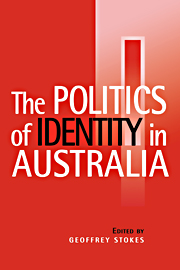Book contents
- Frontmatter
- Contents
- Acknowledgements
- Contributors
- Introduction
- Theorising Identity
- Gender and Sexuality
- Race, Place and Citizenship
- 8 Racialism and Democracy: The Legacy of White Australia
- 9 Immigration and National Identity: Multiculturalism
- 10 Australia and Asia: Place, Determinism and National Identities
- 11 Citzenship and Aboriginality: Two Conceptions of Identity in Aboriginal Political Thought
- Culture: Literature and Film
- References
- Index
11 - Citzenship and Aboriginality: Two Conceptions of Identity in Aboriginal Political Thought
Published online by Cambridge University Press: 05 June 2012
- Frontmatter
- Contents
- Acknowledgements
- Contributors
- Introduction
- Theorising Identity
- Gender and Sexuality
- Race, Place and Citizenship
- 8 Racialism and Democracy: The Legacy of White Australia
- 9 Immigration and National Identity: Multiculturalism
- 10 Australia and Asia: Place, Determinism and National Identities
- 11 Citzenship and Aboriginality: Two Conceptions of Identity in Aboriginal Political Thought
- Culture: Literature and Film
- References
- Index
Summary
Until recently, indigenous people in Australia were not considered to have had the ideological power to challenge the prerogatives of the Australian state (see Howard 1982: 1). This chapter aims to revise this interpretation and demonstrate how Aboriginal people have deployed a number of distinctive political ideas and arguments. In their attempts to influence the policies of the Australian state, Aboriginal activists have engaged in a struggle over ideas in which notions of Aboriginal identity have played a key role. The question of who is a ‘real’ Aborigine or Torres Strait Islander is central to conflicts over access to political and economic resources. For this reason, the practical problem becomes one of how indigenous people present themselves to Australian governments, as well as to each other.
From the beginning of white invasion, the very category ‘Aborigine’ assisted in the process of colonisation. By categorising Aboriginal people as a ‘primordial or primitive other’, whites also asserted the superiority of their own collective European identity (Attwood 1992: iii). Such conceptions provided part of the rationale for the dispossession and removal of Aboriginal people from their lands, their violent elimination, and the denial of their political rights. Early European conceptions of an inferior Aboriginal (human) nature, character or identity were later reinforced by scientific theories of nineteenth-century biology and anthropology (see Attwood and Arnold 1992). Such ideas served as the ideological cornerstones for the colonial repression of Aborigines.
- Type
- Chapter
- Information
- The Politics of Identity in Australia , pp. 158 - 172Publisher: Cambridge University PressPrint publication year: 1997
- 7
- Cited by



